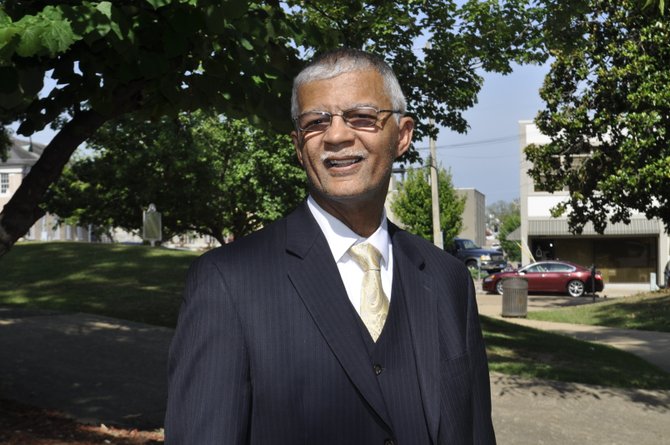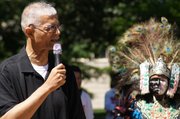Photo by Trip Burns.
The election of Chokwe Lumumba as mayor eight months ago was a big surprise to many people in Jackson—that is, unless you had an ear to the ground. In the neighborhoods, among the silent majority of people who lacked the disposable income to fund expensive campaigns and who believed Lumumba could give them a political voice, Lumumba always had support.
Lumumba was the first to admit that he was a radical. He was never satisfied with the status quo. He became a lawyer for the express purpose of defending people from civil-rights abuses. Over four decades, Lumumba advocated for the disenfranchised and dis-empowered, and he gained an international reputation and following. But neither the accolades nor the hard work hardened him. Instead, it strengthened his resolve for service and made him more inclusive.
It was Lumumba's character and brilliance that had like-minded people come to Jackson to continue the work for equality begun during the civil-rights era. In Mississippi, where it took the protection of federal troops to have African Americans attend public schools and universities with whites, Lumumba believed a new era of the movement—an economic revolution—could take root and flourish.
"There's a problem with economics in the United States," Lumumba told the Jackson Free Press in early February. As he saw it—and many agree—the Wall Street version of American prosperity excludes most American people of all races and ethnicities.
The problem shows up in the disconnected "relationship of the employee to the job," he said. "It's (in) the commitment of the government to make sure everyone's fairly treated in the society."
Lumumba's economic vision sees people as creators of their own prosperity, claiming the power of self-determination. The people who inspired by Lumumba recruited him to run for a seat on the Jackson City Council in 2009 and for the mayor's office in 2013. "We are a population here now in the need of a lot of development," Lumumba told Democracy Now last June.
"Development is one of the tracks, or one of the roads, to human rights and to the recognition of human rights, especially our economic human rights. And some of that development is going to take the kind of leadership and the kind of consistency that we had in the struggle for voting rights and other kinds of rights, which has been unique to our history."
Lumumba never wavered from his mantras, either in his speech or his actions. Chief among them was "the people must decide" and his campaign motto: "Educate, motivate, organize."
In the few months that Lumumba held the title of mayor, his quiet grace, consistency and dedication to the people's welfare shifted the perceptions of even his biggest detractors, including many white conservatives who feared him during his campaign.
"I guess they were expecting a monster," Lumumba told the Jackson Free Press Feb. 5. "And I'm just Chokwe Lumumba, the same person I've always been."
People afraid that he was too radical and divisive, and who backed other candidates in last year's mayoral election, soon learned he was about bringing people together for the good of the city and its residents.
"I have never met a person like Chokwe," Ben Allen, president of Downtown Jackson Partners, told the Jackson Free Press upon hearing of his death.
"So much theory and presumption but so little knowledge about him before he was elected. I was guilty. I respect him and enjoyed his passion for all of Jackson and his friendship in his short time as mayor. We will miss his kind presence and spirit."
'Mississippi was the Place'
One of the areas that demonstrated Lumumba's inclusive nature and his long-running commitment to the people was immigrant rights' issues. Bill Chandler, executive director of the Mississippi Immigrants Rights Alliance, had worked with Lumumba for decades. The former mayor was one of the founding members of the 14-year-old organization Chandler leads.
"We both felt, independently of each other, that Mississippi was the place that if social change was going to happen in the United States, if it's going to happen, it's got to emanate from the South. ... Mississippi was the place to work, to organize," Chandler said.
"One of the major things we'd been working on for a long time, even before he was elected to city council, was to find a way to make Jackson a more welcoming city for immigrants," he added.
Patricia Ice, MIRA's legal project director, met Lumumba on the picket line in the late 1960s at Wayne State University in Michigan, where they both received their law degrees.
Lumumba had led a protest there against discriminatory grading practices, and returned to support the students even after he graduated. Chandler and Ice, who are married, met each other much later, in 2001.
Working together with Ice, Lumumba presented an anti-profiling ordinance, modeled on one from Detroit, Mich., to the Jackson City Council in 2010, when he held the Ward 2 council seat.
"That was an important ordinance. Basically it established the basis for Jackson to be a better environment for immigrants, regardless of their country of origin and regardless of their immigrant status," Chandler said.
During Lumumba's mayoral candidacy, Chandler went into the neighborhoods, "block-walking," as he calls it. He found many homes that were empty due to foreclosures. MIRA and the former mayor were in conversations to make some of those houses available to immigrants. Chandler has already seen some success, particularly in south Jackson, but he points to law-enforcement's "indifference" as a problem that has yet to be overcome.
"In the previous administration, somehow, the ordinance did not get down to the beat level," Chandler said. As an example, he pointed to a lack of police presence at events where immigrants gathered, such as soccer games at Battlefield Park, and a lack of interpreters who could assist immigrants with crime reporting.
The Hinds County Sheriff's office has made efforts to close the language gap, Chandler said, pointing to the sheriff's hiring of bi-lingual deputies and a dispatcher.
"We still have a long way to go with the city of Jackson," he said. MIRA was working with the mayor on an officer training program for the city's police force.
Chandler was also involved with Lumumba's transition team after his mayoral election, focusing on the city's parks and recreation department. The team was able to identify several new sources of revenue, such as grants, to expand the city's parks to transform them into recreation centers, and train park rangers in community outreach. Rangers are primarily law-enforcement officers, Chandler said, which limits their effectiveness to interact with people using the parks for legitimate purposes.
Like many in Lumumba's circle, June Hardwick had a long-term relationship with the mayor. She first met him 25 years ago, when she was 13 years old. Last August, Lumumba appointed her to Jackson's Municipal Court bench.
"The mayor accomplished in .02 seconds more than his prior mayors," Hardwick said. "... The initiatives that we see right now, today, were under development" for years. "Those of us who have worked with him, regardless of their affiliation with the Malcolm X Grassroots Movement, what people are not surprised by is all that he was able to accomplish in such a short period of time," she added. "We're not surprised, because this has all was a part of the plan."
Working for the People
In the days following Lumumba's death, those who knew him best eulogized him in print and on the air. Akinyele Umoja, associate professor and chairman of Georgia State University's Department of African American Studies, was a founding member— along with Lumumba—of the Malcolm X Grassroots Movement and the New Afrikan Peoples Organization.
Umoja emphasized that the mayor always deferred to the people who elected him.
"When you heard ... him saying, 'the people will decide,' that slogan was put into practice by organizing an assembly that would develop his platform," Umoja said on a Democracy Now radio broadcast Feb. 26. "So his platform actually came from the community and not out of his head or not out of our organization. They formed this People's Assembly that helped him get elected, formed his platform, but also stayed organized while he was serving the city council to provide him with direction on how he should proceed on policy."
Hardwick confirmed Umoja's assessment.
"It wasn't just his idea," she said. "There was a lot of deliberation over whether he should run."
That kind of leadership takes someone capable of putting his ego aside. And though a "people's movement" is, perhaps by definition, a leaderless movement, the people looked to Lumumba to keep the train on the tracks and moving forward within city government. They could count on Lumumba to make hard decisions and push difficult agendas without giving up his principles.
Perhaps the most difficult decisions Lumumba had to make was to put at least some of the financial onus for fixing the city's crumbling infrastructure back on the citizens. The measures he enacted would further strain the budgets of many people in Jackson. The U.S. Census Bureau put the percentage of Jacksonians below the federal poverty level at 28.2 percent in 2012, and the median individual income at below $19,000 annually. But the measures were necessary in the face of the millions the city needs to fix or replace its ancient pipes and pot-hole decimated roads.
In August 2013, Lumumba announced increased rates for water and sewer services. Then, in September, the mayor said he wanted to put a 1-cent sales tax increase to a vote. Jackson would lose the opportunity to levy the tax, which the Mississippi Legislature enacted in 2011, in July. The voters had to approve the tax by a 60 percent majority.
The law was controversial from the start. It specifies a 10-member oversight commission and gives Jackson only three appointments. Both Lumumba and former Mayor Harvey Johnson Jr. were vehemently opposed to commission, but true to his word, Lumumba let the people decide—though not without some urging—after indicating that he had made a deal with the chamber over the appointments, which the chamber denied.
Voters overwhelmingly gave their approval in January, and the tax increase took effect March 1. The projection is that it will raise $15 million annually toward the city's infrastructure needs.
"I still adhere to the concept that the commission shouldn't be there," Lumumba said last month, but he worked with what he had. He negotiated and suggested appointees to all parties and asked them to respect his submissions.
When the Greater Jackson Chamber of Commerce announced its four appointees Feb. 20, all of the appointees were residents of Jackson and two were presidents of the two historically black colleges in Jackson. The chamber's direction under the law was to appoint Jackson business owners, and it maintained that its appointees were of its own choosing. Nonetheless, the outcome is, perhaps, a testament to Lumumba's gentle persuasion.
"The Mayor's opinions on things would change somewhat as he gained more information," Hardwick said. "He was very open-minded, and he was very reasonable. Things had to make sense to him before he would move forward."
In the wake of his death, the question for many people is whether the community initiatives Lumumba set in motion will survive. The people on the ground are confident that they will.
"While we recognize Lumumba's leadership is irreplaceable, MXGM always operated on the basis of collective leadership, and we will be drawing on that collective leadership now more than ever," said Kali Williams, Jackson's special projects and external funding coordinator.
Williams and his wife, Sacajawea Hall, are heavily involved with Jackson Rising, a project that is educating and encouraging Jacksonians to begin cooperative, employee-owned businesses. The group kicked off the project in January with a session at the Roadmap to Health Equity building at the Jackson Medical Mall and will hold another informational session March 13 at the New Dimension Ministry on Alta Woods Boulevard in south Jackson. Jackson Rising also has a big conference planned for May 2-4 at Jackson State University.
Jackson Rising has set up a fundraising website on Indigogo to raise $10,000 for the conference. It's appropriate that the funds for a people's project should come from the people.
"People are stepping up locally, and people are stepping up nationally," Hall said, but she stressed that this is a local movement. Organizers have gone back to the neighborhoods to rally support for the initiative, going door-to-door to speak with the people, just as they did during Lumumba's political campaigns.
"We're going to continue to do the work," she said.
Building a Cooperative Economy
One of Lumumba's great strengths was to surround himself with people aligned with his vision, even convincing them to move to town and help make the MXGM's Jackson "Kush" Plan a reality. Lumumba saw Mississippi as fertile ground for the plan, which is based on black-nationalist ideals, including a decentralized government run by committees of the people, called "People's Assemblies."
The plan causes considerable consternation for some Jacksonians, many of whom believe that it will force businesses and white citizens out of the city. The economically powerful perceive it as a threat to their hegemony.
"The good thing about the mayor's plans is that they weren't singular plans," Hardwick said. "It is a collective effort, so although he is now missing, the plan will continue to unfold, whoever is elected."
Among its central ideas is to build the local economy through "a process of promoting cooperative economics that promote social solidarity, mutual aid, reciprocity and generosity," including "worker cooperatives to informal affinity-based neighborhood bartering networks."
The far-reaching plan also includes housing co-ops, community-development credit unions, local urban farms and farmers markets, working with young people to increase civic engagement and challenging "right to work" laws. Expanding green public transportation and creating a network of solar and wind generators is also is among its goals.
Jackson Rising organizers have embraced the MXGM vision to make Jackson the focal point for modeling empowered grassroots economic development.
"We are at a forefront, now, that is not only going to affect Mississippi," said organizer Iya' Falola H. Omobola during the Feb. 27 Jackson City Council meeting. She added that the model set through Jackson Rising has the potential to affect economics across the country in an era where the status quo long ago stopped supporting the majority of working Americans.
Shelby Parsons of Rainbow Cooperative Grocery also spoke to support the Jackson Rising conference at the council meeting. Rainbow organized as a cooperative in Wisconsin before setting up shop in Jackson. Current state law allows only a narrow category of cooperatives, which adds challenges for Jackson Rising, although work-arounds exist such as incorporating out of state or forming limited partnerships.
"Cooperatives are run democratically by their worker-owners," Parsons said. "The decisions that are made are made for the benefit of the many, not the few," and provide living-wage jobs that have the potential of moving people out of poverty. Because local people own them, cooperatives contribute to a recession-resilient and equitable economy, she added.
Hall said that the sense of hope and empowerment such a movement can engender is as important as the tangible results it can produce. Jackson Rising does not intend to fold up its tent, and the city council pledged its support for the conference through a resolution adopted Feb. 27.
The item on the meeting agenda still had Lumumba's name as its sponsor.
'I Work Hard'
During the Feb. 5 interview with Lumumba, this reporter remarked that he looked tired—which he did—and asked him about the never-ending rumors about his health.
"It's this job," the mayor replied with an exasperated sigh. He quickly added that he appreciated people's concerns. "I plan to be around for a while," he said.
"I'd probably be looking like this if I was still practicing law," he added.
"I work hard, and if you work hard, sooner or later it tells on you."
Chokwe Lumumba died Feb. 25.
"I would never imagine in a million years, or could have predicted that he would die," Hardwick said.
"He should be here and alive and well. Clearly, his body was tired, and God just called him home. We have to accept that."
The job for the people now is to find the strength within themselves to continue and generate the energy necessary to bring the MXGM vision to reality. They must find and support the right person to fill Lumumba's very large shoes within the city government.
The city council will set a date for a special election within the next couple of weeks. By law, the election must take place within 30 to 45 days. As of this writing, no one has announced a candidacy.
"I think that we probably have the best city council that we've ever had in the history of the city (and) that is very supportive of the kinds of things Chokwe was talking about and working for," Chandler said. "What we need is someone that will provide the kind of leadership to continue the work that Chokwe started. At this point, you can't even speculate who that might be. ... We need to regroup to continue that work."
See a gallery of Lumumba photos at jfp.ms/lumumbapictures. See an archive of stories, images and audio at jfp.ms/lumumba.





Comments
Use the comment form below to begin a discussion about this content.
comments powered by Disqus